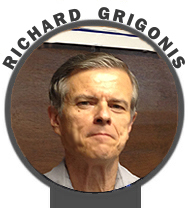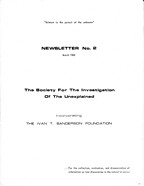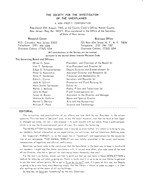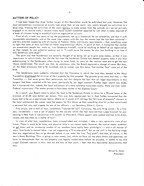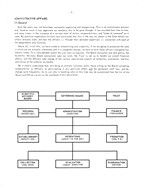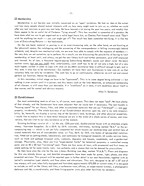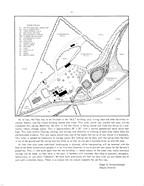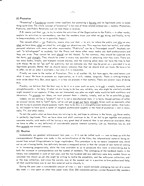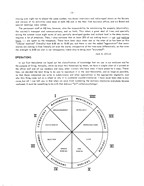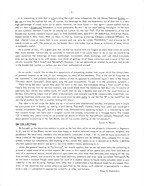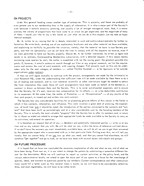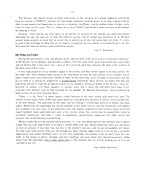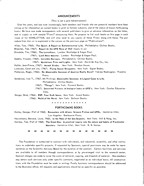Archive of SITU Publications: SITU NEWSLETTER — Number 2 — March, 1968
"Science is the pursuit of the unknown"
NEWSLETTER No. 2
March 1968
The Society For The Investigation
Of The Unexplained
Incorporating
THE IVAN T. SANDERSON FOUNDATION
...For the collection, evaluation, and dissemination of
information on new discoveries in the natural sciences
THE SOCIETY FOR THE INVESTIGATION
OF THE UNEXPLAINED
A NON-PROFIT CORPORATION
Registered 25th August 1965, at the County Clerk's Office, Warren County,
New Jersey, Reg. No. 169571. Also registered in the Office of the Secretary
of State of New Jersey
Research Center R.D., Columbia, New Jersey 07832 |
Business Office 325 West 45th Street, N. Y., N. &. 10036 |
All contributions to the Society are tax exempt,
pursuant to the United States Internal Revenue Code.
The Governing Board and Officers:
| Oliver G. Swan Ivan T. Sanderson Edgar O. Schoenenberger Peter G. Kamitchis Alma V. Sanderson Edna L. Currie Jack A. Ullrich Hans Stefan Santesson Walter J. McGraw John A. Keel Susan A. Brown Andrew A. Guthrie Nevett S. Bartow William F. Peck |
President, and Chairman of the Board (b) Vice President and Director (b) Deputy Director and Establishment (b) Assistant Director and Research (b) Treasurer adn Membershipo (b) Secretary and Records (b) Promotion and Fund Raising (b) Editor (b) Radio, Films and Television (b) Field Investigations (b) Assistant to the Director and Manager News and Special Events Arts and the Humanities Science and Technology |
EDITORIAL
The actualities and practicalities of our affairs are laid forth by our President in the column opposite. This has been a "peculiar" year, to say the least l However, now that we have at last legally changed our name, we can — and propose — to push onward with our plans. From a publicational, which is to say the disseminational, point of view, this means the following.
The NEWSLETTER has been expanded, and it may be so even further. It's intent is to bring to you, our members, factual information on our organization, our activities, and our intentions. Nothing more.
Our 'magazine', PURSUIT, is, as the jargon has it, "Iayed-out"; and negotiations for the resuscitation of our newspaper "THE ANIMAL WORLD" are now totally ensnarled in the usual, and normal, complexities of legalities and official inefficiency.
Meantime, we have come to the conclusion that the Newsletter is the best way to keep in touch with our members. I might add that these newsletters will, if issued more often, also take some of the load off our Director, who has a 'genius' for starting-up hares! Honestly: that mail!
For the rest I, as Editor, would just like to point out that we now have in these NEWSLETTERS a medium for relaying just what is going on. There is much; and it is up to me as your Editor to get over to you the most salient points. We've got a "Lion by its tail"; and, if it goes on this way, our Deputy is going to be a very busy man) Meaning simply that the library — which is under my aegis — is literally spilling out of the doors of all our buildings.
So help me; we have got "something" by the tail. Greetings!
MATTERS OF POLICY
It had been hoped that three further issues of this Newsletter would be published last year. However, the most extraordinary succession of events took place that, at one point I very nearly brought our activities to a dead stop. Viewing the activities of the (now) Society to some extent from the outside l as I am not actively engaged in its routine work, I several times found myself somewhat appalled by just what is today required of a body of citizens trying to establish such an organization as ours.
First of all, it took two years to lay the groundwork, set up a framework for our enterprise l and test it with innumerable adjustments, and at the same time comply with the law. No sooner had the last been achieved and this entailed complying with all manner of Federal, State, and County requirements — than something came to light that more or less nullified all these long-drawn-out efforts. In point of fact, it transpired that neither our promotional people nor l more so, Ivan Sanderson himself, could do anything on behalf of our organization as then named. As one potential sponsor put it: "I could raise the money for your new building in no time if onIy Sanderson were dead!"
The point was that foundations are normally thought of as being set up to give away money, so that it was impertinent to solicit funds. Nor did the fact that the Sanderson Estate had deeded property make it any less embarrassing to the Sandersons when trying to raise funds to carry on the routine work and to get the new library established. The result was that, by unanimous vote, the Board approved a change of name. But then, all the legal processes had to be reworked: and no sooner was this done, that another 'bolt' came out of the blue.
The Sandersons were suddenly informed that the Township in which the land they deeded to the (then) Foundation disallowed the division of their property for that purpose. The grounds given were that they — the Township — had never given their permission; but this despite the fact that all legal requirements in this respect had been complied with two years previously by our legal counsel! Further legal search was made, but it transpired that, indeed, the local ordinances of a mere township transcend county, State and even some Federal injunctions! (The matter proved to have been tested in the Supreme Court)
As a result, your Board voted to return the land to the Sanderson Estate in return for a 99-year lease at the minimum of $1.00 (one dollar) per annum. This was duly regularized l but it then further transpired that the lease had to be on a year-to-year basis; otherwise it would still infringe the "division of property" clauses in the local ordinances! No sooner were the papers for this drawn up than something else hit us that constituted a personal but very real tragedy for one of our officers — our Secretary, Edna L. Currie.
Fire struck; and in half an hour, completely "cleaned her out". Curiously, the only thing saved - by a fireman, incidentally — was a set of papers for the society which she had received from Legal Counsel for processing in New York in conjunction with myself, as President. (These papers were soaked and had to be dried, ironed, and reprinted, as a matter of fact!)
In view of what has, nonetheless, been accomplished and initiated, I take a very optimistic view of our future. There is much to be done, and physical help is our sorest need. However, the routine seems somehow to get done, and an increasing number of our members have realIy been pitching-in — and in all manner of ways, from funds to manual labor. I am not suggesting a "five-year-plan", but we are still in the building stage that any organization has to go through before it can make the first "big push". And that, of course, is the new Library Building. This is going to take money; but, while we have all the plans drawn and approved, we have to demonstrate that we are properly and legally established before we proceed. It seems to me, and Legal Counsel concurs in this, that we are now at that point. I feel that this Newsletter demonstrates that fact.
Oliver G. Swan
President
ADMINISTRTIVE AFFAIRS
(1) General
Over the years now, we have been constantly organizing and reorganizing. This is an evolutionary process and, however much it may aggravate our members, has to be gone through. It has resulted from time to time, and many times, in the issuance of a revised chart of duties, responsibilities, and "order of command" as it were. By practicaI experience we have now discovered that this is the way (as shown in the Chart beIow) our affairs actually work; and how the officers — through their personal expertizes — concerned with each of the departments also function.
Above all, in all this, we have aimed at streamlining and simplicity. If we are going to prosecute the work in which we are mutually interested, and in a competent manner, we have to have those officers and operatives therein listed. To a considerable extent the Law also so requires. The Board discusses and sets policy; the Scientific Advisory Board pronounces upon our work; the Trust is set up to handle our overall financial affairs; and the Officers take charge of the various specialized aspects of collection, evaluation, and dissemination of the material we handle.
Be it clearly understood that, this being an entirely voluntary outfit, those sitting on the Board, accepting responsibility as Officers, or participating in any particular effort, and the permanent staff may, and do, change quite frequently. As to just who is handling what at this time may be ascertained from the list of the Board and Officers given on the masthead of this Newsletter.
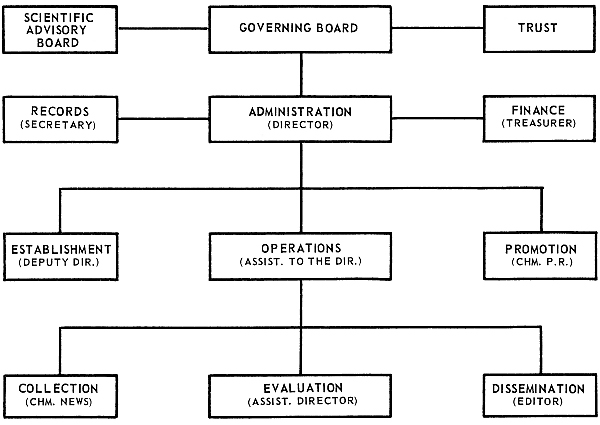
(2) Membership
Membership in our Society was initially conceived as an 'open' invitation. We had no idea at the outset just how many people shared mutual interests with us; how many might want to join us; or, whether we could offer any real services or gain any real help. We have learned a lot during the past two years, and notably that there appear to be an awful lot of Forteans "lying around". This has resulted in somewhat of a paradox. We have done what we can to get organized on a solid legal basis but, as Charles Fort himself once said: "Don't wish for anything too much — you just might get it"! The result has been somewhat terrifying. It is like the Law of Diminishing Returns — but backwards.
On the one hand, material is pouring in at an ever-increasing rate; on the other hand, we are bursting at the (physicaI) seams; the cataIoguing and the answering of the correspondence is faIling increasingly behind schedule; and, despite new mechanical aids, we are ever less able to comply with the requests of members — the very duty we set ourselves up to perform. As a result, we are discussing the possibility of having to limit membership; at least until, and unless, we get the new library built and further permanent, paid staff employed and trained. As of now, a thousand regular-paying Subscribing Members would just about cover the basic routine costs; but not any staff! And, unfortunately, such staff has to be of not only a high, but of a very much higher, caliber in order to cope with what we do. (Mere secretarial help is difficult enough to get; and in this area it also has to be maintained.) Our members all have their own businesses to take care of, so that voluntary help can onIy be incidental. The work has to go on conti nuousIy; otherwise we will not and cannot perform our function. Hence the paradox.
In this secondary initial stage we have to be "sponsored". This is to some degree being achieved — but nothing is ever certain until it is proven; and this means cash on the line! Meantime, an enhanced membership of all classes is still more than just desirable. If it "overflows" as it were, it will doubtless adjust itself in due course, and for normal and obvious reasons.
Alma V. Sanderson
(3) Establishment
Our most outstanding need as of now is, of course, more space. This does not mean 'land'. We have plenty of that already; and the Sandersons have more adjacent that we could rent if necessary. The real trouble is "housing space" for our library, files, and other accumulated materials that are our "life-blood" — and your property, incidentally. The whole business of our Establishment devolves upon me, and is my sole responsibility. So, herewith, we display a survey map of the Society's land, buildings, and other physical properties. I would like to explain this in more detail because we are in the midst of a whole series of moves, and innovations, that are vital to our very existence as of the moment.
Existing buiIdings consist of: — (a) the old, (230-year-old), double-storied house with an attached, single-storey, four-room bungalow. (b) a 60-ft. by 24-ft. concrete, one-storey, building marked "M.S." on the accompanying map — which is not yet fully completed but which houses our machine-shop and several tons of stored materials that are of considerable value. (c) Two, 36-ft. by 10-ft. city buses of sprung-steel construction, fitted out as potting-sheds, laboratories, and workrooms for biological research. (d) sundry service items, such as trash and garbage disposal units, cookouts, dog-pens and houses, woodsheds, and a garden-tool storage. Physically, also, there are five "experimental fields" for botanical purposes; a controlled swamp pond; and an 80 x 80 foot "swimming" pool. There are four acres of lawn, with ornamental and fruit trees; an ample parking lot for some twenty cars; two orchards; and a stream that can be damned for pisciculture.
We then have aIso the site for the new Library BuiId ing (see Map, marked "P.N.B."). Plans and diagrams for this are already drawn up, and detailed arrangements have been made for power, light, phone, and other essential services. This project will be reported upon in further detail in our next Newsletter; together with an (artist's conception type) sketch, and floor plans and elevations. This unit, designed to be 60' x 30' and of two storeys, wiII cost, when fuIly equipped and furnished, approximately $70,000 at current rates. It is designed to include, as well as the library and files, a conference room, offices, an experimental kitchen, a photographic darkroom and lab, a sound-studio, and three living-quarter units plus other facilities for members.
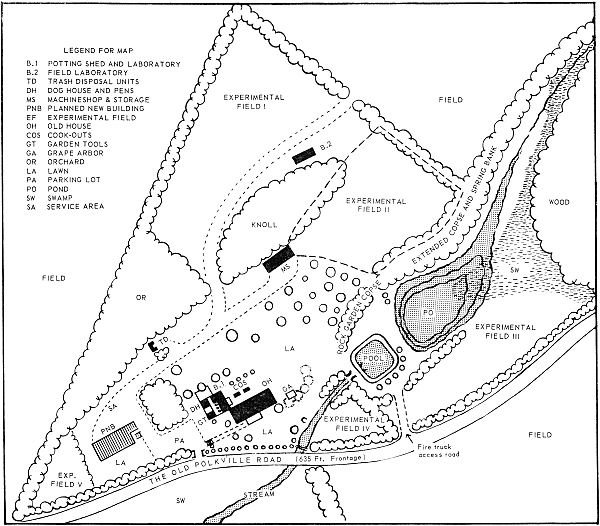
As of now, the floor has to be finished In the "M.S." building; plus wiring, heat and other facilities installed therein, and the whole building sealed and lined. This work, which was started last year, will be completed this spring. Meantime, the attic in the Old House is being sealed and lined and set-up as a subsidiary library storage space. This is approximately 30' x 20', with a central peeked-roof about seven feet high, This work entails flooring, walling, and ceiling, and attention to trimming at both ends where there are old-fashioned windows. This new space should take care of the books that are as of now stored in a basement. This latter is needed for expansion of storage space. But nothing can be done until the spring when the frost is out of the ground and the spring mud has dried up so that we can get a concrete-mixer up onto the land.
At that time also some additional landscaping is planned, while tree-planting will be renewed with the help of the State conservation people. It is my first duty, however, to try to provide new space for the Society's properties. This — and quite apart from the new building — needs money. At the same time, really enormous savings can be made, as they have in the past, if members will volunteer their help as planners, designers, technicians, or just plain "laborers". We have built practically all that we have with our own hands and on just such a voluntary basis. There is no reason why we cannot complete the job this way.
Edgar O. Schoenenberger
Deputy Director
(4) Promotion
"Promoting" a Foundation sounds rather repellent; but promoting a Society and its legitimate aims IS something quite else. The whole concept of "promotion" is but one of three related enterprises — namely: Promotion, Publicity, and Public Relations. Let me take these in reverse.
P.R. means just that; i.e, to try to relate the activities of the Organization to the Public — in other words, explain its activities to non-members; see that the members know just what we are doing; and finally, to try to keep everybody, as far as is possible, happy!.
The second effort — i.e. Publicity, means also just that: — to wit, to inform the public just who we are, what we have done, what we stand for, and what our objectives are. This requires frank but tactful, and rather personal relations with news and other mass-media. "Publicity" can be a "two-edged sword". Anybody can sell "a bill-of-goods" to anybody; but the Press and these other mass media are both professionals and they are wise. They cannot be (and should not be) fooled. To the contrary, they should be supplied with the facts, and straight. They should be aided in every way possible in obtaining what they want. There are too many kooks, krooks, and krakpots around anyway, and the working press does not have the time to fool with these. We do not "go out" for publicity; but we welcome any that may be given us — provided it is on legitimate grounds. Better that we should remain unknown than that we should dish out trash. We have a lot to offer, so let us make it available — but only if it is requested.
Finally we come to the matter of Promotion. This is of another ilk, but here again, the word means just what it says. We have to promote our organization, or it will, indeed, languish. There is nothing wrong or even snide about this. But, once again, it is how we promote it that matters. There are several ways of doing this.
Frankly, we believe that the best way to do it in a case such as ours, is to ask — simply, honestly, and straightforwardly — for help. If what we are trying to do has any validity, any who might be similarly-minded might respond to our appeals. If they are not interested, any plea we might make would be both worthless and obnoxious. To promote our ideas, we must present them — clearly, simply, and as far as possible in toto.
Indeed, we are selling a "product"; but it is not a manufactured item; it is facts, though perhaps of rather an unusual nature. And to "sell" facts, we've just got to get our facts straight. Given such an approach, what we are trying to promote should promote itself. How to do this is a straightforward technical matter. And luckily, we happen to have quite a roster of longterm professional experts in the field of promotion — and in news, radio, TV, and other media.
To teII the public what we have done; are striving to do, and hope to achieve in the future, via these media, is perfectly legitimate. This we have done and shall continue to do. If we fail to get together and produce concrete results, said media will be losing a very great deal of material that is not otherwise available. What we have to offer is very definitely of considerable popular interest currently. Let us, therefore, say so, and thus promote our mutual interests.
(5) Routine
Undoubtedly our greatest achievement last year -- if it can be called such -- was to keep up with the correspondence! Progress was made in the reclassification of the files, the informational material being removed from actual filing-cabinets to large ring-binders. This procedure is by no means completed and, while not as yet a losing battle, has definitely become a rearguard action in that the volume of new material coming in is increasing progressively, while the time available to us to prosecute this work is diminishing due to both the increase in correspondence and the number of members. The cataloging of the hardback books in the library was completed in June of last year, and the two hundred odd new additions were duly carded. Since no volunteer has shown up yet who might be willing to tackle the pamphlets, and the soft-cover collection, end/ or the map collection, and since the society was at the moment not in a position to hire professional help, all that could be done was to sort this material and to classify it. During the past year a considerable amount of time -- and I would estimate averaging two out of a seven day week -- was spent on other than paper work. Over 200 interested parties visited Research HQ; members staying over night ran to almost the same number; two dozen interviews and radio-taped shows on the Society and various of its activities were done at both HQ and in the New York business office; and six Board and special meetings were called.
The permanent staff at HQ has, however, also the responsibility for maintaining the property (physically), the society's transport and communications, and so forth. This takes a great deal of time, and specially during the summer since eight acres of only partially developed garden and orchard land in the deep country requires a lot of attention. Then, I also estimate that at least 20% of our waking hours — not just working hours — are spent on the telephone. There have been days when one or the other of us has been on thi s "infernal machine" (literally) from 8:00 am to 10:00 pm; and there is now the added "aggravation" that newsstories are coming in from literally allover the world, irrespective of the time-zone differentials, so that even the midnight to 8:00 am slot is not infrequently liable also to being most "disturbed"!
Jack A. Ullrich
OPERATIONS
In our first Newsletter we layed out the classification of knowledge that we use in our analyses and for the purpose of filing. Actually, while we know this framework by heart, we have a simple chart of it pinned on the office wall and all our members and many other visitors who have seen it have asked for a copy. Therefore, we decided the best thing to do was to reproduce it in the next Newsletter, and as large as possible, so that those interested can write in subdivisions and other specialities in the appropriate segments. Just why this thing came out as a wheel or why it is numbered counter-clockwise I have never been able to discover, but all I can tell you is that when we once tried numbering the sections clockwise everybody became confused. It must be something to do with that dubious "art" called psychology!
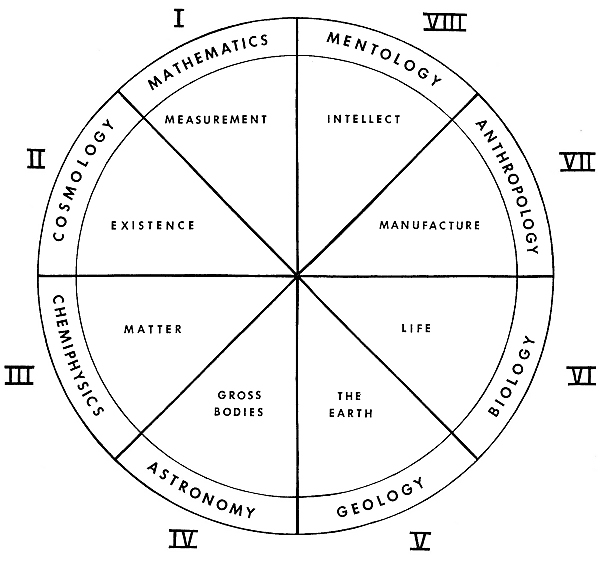
It is interesting to note that In sub-dividing the eight major categories, the old Dewey Decimal System System — per se, may be applied but not, of course, his headings as they are hopelessly out of date and in a very high percentage of cases quite out of place. However, we have found -- and again I cannot explain how or why -- that a duodecimal breakdown is much preferable. By this I do not mean adding two-digits (in the form of new symbols) between 9 and 10 so making our current 12, the new "10". (For the mathematics of the true Duodecimal System, members should apply to THE DUODECIMAL SOCIETY OF AMERICA, 20 Carlton Place, Staten Island 4, New York). What we mean is, that by inserting a starting Category numbered "0" (zero) for that infernal class of items that is ever present and can only be called "GENERAL", and allowing for 12 sub-divisions as well, the material can be broken down into either four or three or multiples of same, which is extremeIy usefuI.
As a matter of fact, it's a great pity that we did not evolve with six fingers on each hand since we would then have learned instinctively to calculate in twelves and if we could learn to do so now we would bring upon ourseIves the bIessings of every bookkeeper, accountant, stock exchange, and iust about everybody else having anything to do with money. Just think of getting rid of those ridiculous and in point of fact not strictly accurate "33,1/3.rds" and "66.66%s". However, I do not advocate an attempt to multiply and divide in the duodecimal system — unless you are a born mathematical wizard!
. . . . . . . . . . . . . . . . . . . . . . . . . . . . . .
As an aside, I would like to take this opportunity of presenting another lost cause which has always been of greatest interest to me and, it now transpires, to many of our members. This is the sort of thing that we are interested in; and probably because it smacks of real as opposed to concocted logic. I refer to the famous "'Thirteen Month Calendar". Once again, pity the poor accountants. To put it in the proverbial nutshell: —
There being 365 days (ignore leap years for now) in the year, and everybody being a "lost cause" on New Year's Day anyway and for obvious reasons, one could break down the remaining 364 days into 13 months of precisely four (seven day) weeks each. AI! could start on say a Monday and end with the usual faze-out on Sunday. Calculating wages and all other disbursements and receipts would be immeasurably simplified, calculating machines could cost less, and we would even be able really to use the "no 'R' in the month" for the serving of oysters; but that is another (biological) story!
The idea is to set aside the 365th day as a universal and international holiday; and please note it would be concurrent with a Sunday so making a still better "hoIiday". Further, every four years one wou Id get a second unnumbered "'day off", and at a better time, astronomically speaking to boot. It is interesting to note that several things like radio and tv program cycles are already calculated on a 13-week basis. The number '13' is really very useful since, as we pointed out above, it allows for that difficult category "General". How about general accounting in the 13th Month, and all tax cycles starting on the 1st January?
Susan A. Brown
ON COLLECTING
We brought up the above two matters to point up the fact that, while we are primarily interested in Segments V, VI, and VII of the Wheel, we are more than happy to receive selected material on all oddities, enigmas, and paradoxes. We have many members who are primarily intere sted in Nos. I to IV, and we have consultants in these fields of the highest caliber to whom items falling therein can be refered. Only category VIII is completely without our competence, and anything of this nature that comes to us is passed on to Walter J. McGraw who has specialized therein and built a very fine modern library pertaining to it.
Under the general heading of "collecting", we should explain that we do not mean only the collecting of printed or taped material or written reports. We cover in this aspect of our operations also field work and not only of a reportorial nature. Actual physical specimens are also more than welcome; and ranging all the way from animals, plants, and minerals to individual oddities, artefacts and even some so-called "antiques". We do not have a museum though some space for such of a modest nature to house really valuable items is provided for in the new building. Perhaps later, ofter that is established a true Museum might be envisaged. However, in the meantime and unless otherwise specified by the donor, such material is periodically — about once a year — presented to appropriate scientific or other institutions.
Peter G. Kamitchis
ON PROJECTS
Under this general heading comes another type of enterprise. This is projects, and these are probably of even greater use to our membership than is the supply of information. It is also a major part of the Society's work because it entails analysis, planning, ,and usually a lot of straight managerial work. And, it is extraordinary the variety of propositions that have come to us since we got organized; and the magnitude of many of them. I would just like to say a few words on just what we can do in this respect. Let me take an hypothetical example.
Mr. A. writes to us, saying that he is deeply interested in such and such a subject and asks for further information. We write back, sending one of our explanatory brochures and any other material we have available, and explaining as tactfully as possible the situation; namely, that the material we have is now Society property, and that we (personally) just do not have the time to comply with all the requests we receive, even if we were permitted to hand out Society property. Should Mr. A. be further interested, he writes us again and sends in an ordinary, Corresponding Membership subscription, with a detailed request. If this means merely answering some queries by mail, the matter is expedited with (as the saying goes) the greatest possible dispatch. If, however, it entails extensive search through our files or any original research, we list the requirements and assess tbe cost of said research, with copying charges. Full projects such as this can be undertaken on only for the next category of members — called The One Hundred — or for Sponsors; or for outside organizations under contract.
If then we still agree mutually to continue with the project, arrangements are made for the initiator(s) to visit Research HQ., under the understanding that sufficient time will be made available by them there to do a lot of reading and research, and to visit whatever sciet1tific or other institutions might be needed to obtain the final information they need. Once all such arrangements have been made on behalf of the Member(s), a contract is drawn up between them and the Society. This is to cover out-of-pocket expenses, and to assure that the Society, for it's part, receives due compensation for its efforts — as a tax deductible contribution to its expenses. At the same time, the matter of Promotion — or "Dissemination" — of any results of the then joint project, is ironed out and written into said contract.
The Society has very considerable facilities for so promoting genuine efforts of this nature in the fields in which it has contacts, information, and influence. This work involves a great deal of planning, the expenditure of much time and, it should be noted, the introduction of the parties concerned to the contacts and "outlets" that have been built up painstakingly and at a very considerable cost by the founding members of the Society. This is actually the most valuable "property" that the Society has to offer its members and, in return for it, those so aided are asked to arrange that appropriate funds be made available to the Society to carry on its activities, and extend its operation.
It is therefore our request that all of you — Members and potentially interested parties — write us at any time and on any subject that you will. We will do what we can, within the terms of reference outlined above. If we don't have the answers you want immediately available here, we will do all we can to get them answered by the appropriate expert who is associated with us in that particular field. Failing even this, we will tell you frankly that we cannot help. If we can turn up what you need, and that you cannot find elsewhere, we will somehow "get together" and go to work, as we have now done with several dozen individuals and groups.
ON FUTURE PROCEDURE
It is hoped that we have now concluded the necessary explanation of who and what we are, and of what we have been doing. From now on, it is our intent to change the pattern by substituting a somewhat different format for the Newsletter. While we will continue to report on current activities at the policy level, and the various administrative levels, we intend to open the major part of our space to a forum for the interchange of queries, ideas, and answers to questions posed by our members. Current correspondence and other communications could fill a letter such as this several times a month, so we will have to be considerably selective. Also, and most regrettably, we will have to be rather brief.
The obvious, and logical answer to these restrictions is the initiation of a proper magazine such as we have envisioned in PURSUIT, wherein full and proper treatment could be given to as many original (and so often unique) reports and happenings as come to us. However, like Rome.... and by endless other cliches .... only time will show on this count. This is, indeed, but a news "'letter", and the best means we have at the moment for keeping in touch.
However, while asking you once again to be patient on account of not seeing your particular project mentioned as yet, we urge you to keep the material coming, and to unload your questions on us. We have several dozen projects on hand that we would like to publish as of now, but space does not allow. It is only by such a free exchange of ideas that we can hope to accomplish our aim; and by so accomplishing it, we may both ease the load and achieve some worthwhile results.
Ivan T. Sanderson
ON PUBLICATIONS
During the past months a new, and perhaps novel, idea has built itself up to a point of possible usefulness to the Society, to its members, and possibly to others. This has come to be quite unprovoked and unsolicited, and we believe that it has merit. Your views on this would be more than welcome. We refer to the contents of the back cover of this issue.
A very high proportion of our members appear to be writers; and they further appear to be most prolific! At the same time, many members keep asking US for information on both the publ ications of our members and of others whose works are of particular interest to them. At the same time, quite a number of publishers have begun to come to us, asking for cooperation in disseminating information about articles and books that they are publishing and which might be of special interest to our members. Acting on behalf of the Society, I have endeavored to comply with these requests in various ways, and in return the pub I ishers have begun to reciprocate with material such as that enclosed on our member, Dr. Bernard Heuvelmans, whose forthcoming book so many of you have enquired about.
Today it is not "easy" to obtain books, simply because of the mere volume published every year. The authors cannot supply them, either from purely physical considerations, because of certain ethical guidelines, or for both reasons, The publishers at the same time are finding it increasingly difficult to handle individual orders. Bookstores are regrettably few and far between in this great country, and the distributors and jobbers are inundated with new titles. If any bookstore, even the largest, ordered only half a dozen copies of all the 'good' hardback books published each year in this country alone, they would have to expand their stores to city-block dimensions. And when it comes to paperbacks, pocket-books, magazines and other serials and journa Is, the vo Iume becomes overwhelming.
Being in both the writing and publishing business, it is my considered opinion that the best way to obtain a book that you wish specifically is to place a written order with your nearest bookstore where you are known or have an account. It may take time, but this is the retailer's business and he can and probably will obtain the book much more quickly than you can through any other channel. Don't write to us as we are a non-profit organization and cannot therefore retail, or still less wholesale, any product; also we don't have the time, staff, or the money to obtain, package, and mail anything; and quite apart from the billing process. Order direct from the publishers only if they solicit this in the releases that we will be sending you, or if so advertised in our list.
Hans Stefan Santesson
ANNOUNCEMENTS
(This is not a paid Advertisement)
Over the years, and now ever increasingly,'both members and friends who are potential members have been asking US for information on current books in print on fortean subjeds, and of the status of known forthcoming books. We have now made arrangements with several publishers to give us advance information on the latter, and to supply us with sample "Fliers" announcing them. We propose to list such books on this page in each issue of the NEWSLETTER, and will also send to you copies of these Fliers along with these. The procedure from then on is explained in the column on the previous page on "Publications".
Allen, Tom, (1965). The Quest: A Report on Extraterrestrial Life. Philadelphia: Chilton Books.
Bloecher, Ted, (1967). Report on the UFO Wave of 1947 (Apply to us)
Dinsdale, Tim, (1966). The Leviathans. London: Routledge & Kegan Paul.
(1961). Loch Ness Monster. London: Routledge & Kegan Paul.
Gaddis, Vincent, (1965). Invisible Horizons. Philadelphia: Chilton Books.
(1967). Mysterious Fires and Lights. New York: David Mc Kay Co., Inc.
Hallet, Jean-Pierret, (1967). Animal Kitabu. New York: Random House.
Lorenzen, Coral and Jim, (1967). Flying Saucer Occupants. New York: Signet Books.
Patterson, Roger, (1966). Do Abominable Snowmen of America Really Exist? Yakima Washington: Franklin Press.
Sanderson, Ivan T., (1967, 4th Printing). Abominable Snowmen: A Legend Come to Life. Philadelphia: Chilton Books.
(1967). "Things". New York: Pyramid Books.
(1967). Uninvited Visitors: A biologist looks at UFO's. New York: Cowles Education
Corp.
Steigert Brad, (1966). ESP: Your Sixth Sense. New York: Award Books.
(1966). World of the Weird. New York: BeImont Books.
* * * * * * * * * * * * *
FORTHCOMING BOOKS
Earley, George, (Fall of 1968). Encounters with Aliens: Science Fiction and UFOs. (tentative title). Los Angeles: Sherbourne Press.
Heuvelmans, Bernard, (June, 1968). In the Wake of the Sea-Serpents. New York: Hill & Wang, Inc.
Holiday, Ted, (Fall of 1968). The Great Orm: A practical inquiry into the nature and habits of Freshwater Monsters. (tentative title). New York: W. W. Norton
** ** ** ** ** ** ** ** ** ** ** ** ** **
The Foundation is authorized to contract with individuals, and industrial, scientific, and other institutions to undertake specific projects. If requested by Sponsors, special provisions may be made for representation on the Scientific Advisory Board for the duration of the contract. Certain facilities and services are available to all members through correspondence, or by pre-arranged visit to the research center. Nominal charges are made to cover the costs of retrieval, copying, and dispatch of material. Non-members may obtain such services only under specific contracts, negotiated on an individual basis. All communications with the Foundation must be made in writing. Purely business correspondence should be addressed to the Business office. All requests and applications should be as specific as possible.
END OF NEWSLETTER NO. 2, March 1968
